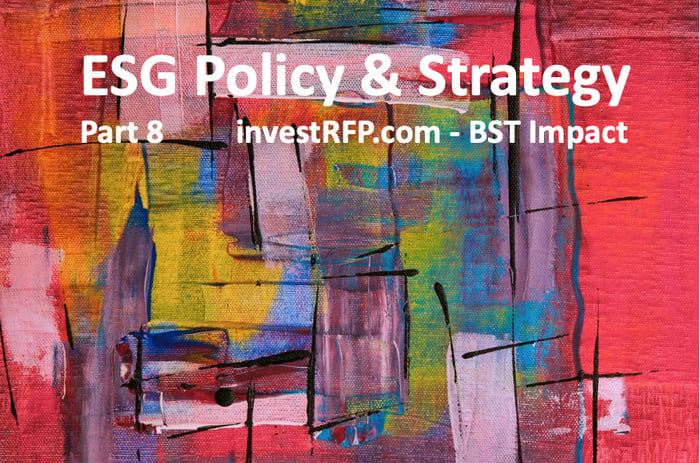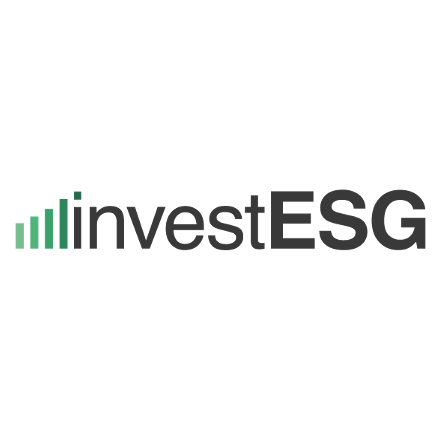

© Steve Johnson
By Kristina Touzenis, Managing Partner BST-Impact Start with your strategy/policy. Stating that you “work toward the SDGs” and they say that “you make certain that your investees’ operations always follow national labour legislation” unfortunately will often be a contradiction if your investees have supply chains in countries where national labour legislation does nothing to work towards the SDGs – the only thing that says is that they are not breaking national law. This article is the Part 8 of a series on "ESG Policy & Strategy"Part 1: Why asset owners need a good sustainable investment policy and strategy?Part 2: SFDR aims at preventing greenwashing and ensuring data comparabilityPart 3: Working towards the SDGs - at 360 degreesPart 4: Due Diligence, Supervision and Enforcement MechanismsPart 5: Bringing down to "Earth"Part 6: Private ImpactPart 7: ESG as a real sustainability toolPart 8: Awareness and attention towards rights and starndardsPart 9: Cyclical ProcessPart 10: ESG Policy & Strategy – Key QuestionsExpert/Specialist Feedback on investRFP | Kristina Touzenis | BST-Impact
This article is the Part 8 of a series on "ESG Policy & Strategy"Part 1: Why asset owners need a good sustainable investment policy and strategy?Part 2: SFDR aims at preventing greenwashing and ensuring data comparabilityPart 3: Working towards the SDGs - at 360 degreesPart 4: Due Diligence, Supervision and Enforcement MechanismsPart 5: Bringing down to "Earth"Part 6: Private ImpactPart 7: ESG as a real sustainability toolPart 8: Awareness and attention towards rights and starndardsPart 9: Cyclical ProcessPart 10: ESG Policy & Strategy – Key QuestionsExpert/Specialist Feedback on investRFP | Kristina Touzenis | BST-Impact
What is needed is an awareness and attentiontowards and basis in international agreed upon labour standards.
Also your strategy (it does not have to be ONE strategy – it can be spread our over specific areas) need to be linked to your indicators and thus your reporting. For a robust strategy everyone who wants to be ready to answer ever more detailed questions regarding their sustainability – and who wants it to be an opportunity and not a burden – should include general parts on non-discrimination and inclusion, participation and accountability as well as linking this to internal processes.Your strategy does not need to be formulated with the language below with reference to specific norms but it makes it easier to make it concrete and divide it into sections that can be linked to your indicators, reporting and the SDGs. At a minimum there will be a need for a general non-discrimination and inclusion – this could read as follows:The principle of non-discrimination is a core human right, both standing alone as well as in relation to the enjoyment of all other rights. Without the right to not be discriminated most other rights become meaningless for large groups of society – most often those already in a position of weakness. All Human Rights Conventions contain a non-discrimination Article and ILO standards are based on the principle. Non-discrimination is found amongst what is called the “core human rights principles”. It is clear that it is a foundation for any meaningful implementation of rights and any real impact of investments. Following that, depending on your activity you would need: Economic and social rights – such as education, health, social security issuesEconomic and Social Rights are rights which are necessary for an individual (or in the case of group rights: any specific group of individuals) to fully participate in society. They relate to the ability to live in safety and dignity and are intricately connected to the enjoyment of civil rights since all rights are indivisible. Furthering economic and social rights in societies promotes cohesion and inclusion and avoids that people become marginalized and unable to contribute to the societies in which they live, due to either a moment of misfortune or lack of health care and education or general poverty. Societies in which social and economic rights are respected will prosper more and have better markets and better economies. Denial of social and economic rights have a profound negative effect not only on the individuals directly affected, but on broader societies.You will be able to see here that the SDGs are all linked to the international normative framework and since governments report on progress towards the SDGs, companies who do likewise, in detail, will be aligned with a number of regulations.Imagine the following scenario: you are operating in an area (or are investing in a company that operates in an area) where access to healthcare is scarce, of poor quality or accessible through corruption. As a company you may think this is not something you can do anything about (while as an investor you may see that your ratings on social issues are not strong). However, if you can establish a system ensuring that a doctor provides basic healthcare to your employees (or your investee’s employees), with a relatively modest step you will have achieved a concrete improvement of the affected communities’ quality of life, and you will be able to report on a very specific action taken to further the SDG Goal 3, instead of having to generally refer to your “investments in the S”. Civil and Political rights such as participationGroups in a situation of vulnerability – addressing specific vulnerabilities in e.g. workforce or who are disproportionately affected by environmental issues. Corruption, not only internally but also offsetting effects of corruption on society.All of the elements of your policy ought to be linked to how promoting protection and implementation of these rights and standards are linked to measuring impact and showing effective impact. It is also important to show that progress in respect for an implementation of rights will not happen overnight.Thinking of a more detailed and more robust Strategy will not only show your understanding of what sustainability is - the links between the S and the necessity of having a good G to do any of this but it will also advance any discourse on ESG issues, including implementation of the SDGs as well as standardised reporting. It will make it easier for you to show that your Investments are truly sustainable.I have mentioned before that it also opens up your portfolio! These days investing in coal is not seen at the most sustainable thing you can do! But imagine investing in a coal mine in Afghanistan now in Afghanistan as far as I have been informed there is quite a lot of coal… and there is lot of people living in abject poverty. bringing energy to these people would get them light to work and study by. It could bring them water it could help them set up businesses. It will be a little bit the opposite of the example of the damn/hydro-energy that I gave before: the positive effect on Society of investing in Coal would by most measurements clearly outweigh the potential damage of investing in coal from a carbon emission perspective - combine that with carbon emission offset in your portfolio and all of a sudden you have a 360-degree view of sustainability. you are literally bringing people out of poverty. On a longer term this will affect positively their participation in society, they will become much more able to make environmentally friendly choices, and you can report and show that you have now understood what sustainability really is about bringing people the possibility to concentrate on things that are not only the barest necessities for survival from one day to another - this will have for short medium and long-term effects on the lives of these people as well as a return for you. Your just stopped investing on ESG from an exclusion perspective and changed lives in the process. This article is the Part 8 of a series on "ESG Policy & Strategy"Part 1: Why asset owners need a good sustainable investment policy and strategy?Part 2: SFDR aims at preventing greenwashing and ensuring data comparabilityPart 3: Working towards the SDGs - at 360 degreesPart 4: Due Diligence, Supervision and Enforcement MechanismsPart 5: Bringing down to "Earth"Part 6: Private ImpactPart 7: ESG as a real sustainability toolPart 8: Awareness and attention towards rights and starndardsPart 9: Cyclical ProcessPart 10: ESG Policy & Strategy – Key QuestionsExpert/Specialist Feedback on investRFP | Kristina Touzenis | BST-Impact
This article is the Part 8 of a series on "ESG Policy & Strategy"Part 1: Why asset owners need a good sustainable investment policy and strategy?Part 2: SFDR aims at preventing greenwashing and ensuring data comparabilityPart 3: Working towards the SDGs - at 360 degreesPart 4: Due Diligence, Supervision and Enforcement MechanismsPart 5: Bringing down to "Earth"Part 6: Private ImpactPart 7: ESG as a real sustainability toolPart 8: Awareness and attention towards rights and starndardsPart 9: Cyclical ProcessPart 10: ESG Policy & Strategy – Key QuestionsExpert/Specialist Feedback on investRFP | Kristina Touzenis | BST-Impact | aboutKristina Touzenis is the Managing Partner of BST Impact. A lawyer and a recognized leader in the effective and concrete operationalization of international human rights standards and principles in complex settings worldwide requiring long-term engagement with a multitude of stakeholders, form both the public and private sectors. She has more than 20 years of experience in advocacy, human rights reporting, monitoring, and evaluating as well as in policy making and negotiating at national, regional, and global level. Kristina founded BST Impact with two other partners in mid 2020, together with a pool of experts to help companies and investors to effectively operationalize ESG criteria, SDGs, international norms and the Business and Human Rights agenda into their respective sustainable business strategies, investment processes and risk assessment management systems. Previously, Kristina created the International Law Unit at the International Organization for Migration – IOM, the UN Agency for Migration and served as Head of the Unit from 2011 to 2020. She engaged with government counterparties on legislation development and review as well as with other Agencies within the UN common system, on advocacy and implementation of programmes worldwide. Prior to her appointment at the IOM HQ, Kristina worked from 2006 to 2011 in the IOM Regional Office for the Mediterranean Region, on translating international norms and standards into practice on the ground and from 2002 to 2006 on implementing children’s rights in the Mediterranean Region for an NGO.
All opinions expressed are those of the author. investESG.eu is an independent and neutral platform dedicated to generating debate around ESG investing topics.
Published by
 investESG
investESG
 investESG
investESG

